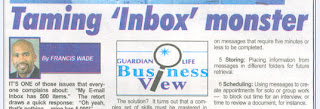 The idea of training customer-facing personnel in the Caribbean to create specific experiences might seem like a tall order, and a highly subjective goal.
The idea of training customer-facing personnel in the Caribbean to create specific experiences might seem like a tall order, and a highly subjective goal.
Can a company charge its front-line workers with doing whatever it takes to create experiences it decides are important for its customers?
For example, what if a bank decides to create an experience of caring, careful and creative with its customers? How would it train its employees to produce that experience reliably?
Well, they could begin by allowing the employee to internalize the definition of the experiences: caring, careful and creative. They would need to do so by looking in two places — their own experience as customers in day to day life, and their experience as employees in the company.
Surprisingly, the latter is perhaps more important than the former.
Employees who don’t look for the experience of caring, careful and creative in their experience in the workplace are going to have a difficult time delivering it to customers. Workplaces that rarely produce the experience will simply fail, and should instead look to implement a culture change programme that results in a different customer experience altogether.
Without it, employees will not have what it takes to produce the experience with their customers, as they will be too busy trying to have some of it for themselves.
Once the experience is internalized, and distinguished clearly in the experience of employees, the company can go the next step and train them to deliver it. The assumption here is that employees who are overflowing with an experience need do little at some level, because their experience will naturally overflow into the customer’s experience. In this sense, customer experience is quite a contagious phenomena.
How do employees get trained to deliver a set of experiences such as caring, careful and creative?
Do they receive a set of rules to follow? Do they follow a script?
Some companies have tried this approach, but it is imply insufficient.
In addition to guidelines, what employees need more than anything else is time to practise.
Producing a specific experience is not as simple as merely mouthing the correct words, or going through the right motions.
Instead, it requires an element of emotional intelligence, due to the need to quickly appreciate the experience that another person is having in any moment. This ability to “read experiences” can be developed through consistent practice.
“Reading the experience” can perhaps be as easy as carefully observing the changes in someone’s face. Some interesting research into couples, and their communication, has revealed that a trained observer can predict with 90% accuracy, the future of the couple’s marriage, after only a couple of minutes.
They are trained to observe the minute changes in muscle motion that we tend to overlook each day.
Perhaps the same kind of training could be given to front-line customer-service workers, so that they can discover the clues that tell them the experience that a customer is having. This of course, would take some amount of practice in order to master, but it sure seems like an interesting place to start.
There are three sources of information that I can recommend on this topic– one is the book Blink by Macolm Gladwell, and here is an excerpt from the book: http://www.hachettebookgroupusa.com/books/68/0316010669/
chapter_excerpt24301.html
In the December 2007 issue of Harvard Business Review, there is an article entitled: Making Relationships Work by John Gottman. He is the psychologist who is the originator of the University of Washington study.





